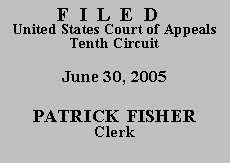

| UNITED STATES OF AMERICA, |
|
| v. | |
| MARTIN ANTONIO-CARDENAS, |
Despite his appeal waiver, Cardenas now wishes to appeal on the grounds that his sentence violates United States v. Booker, 125 S. Ct. 738 (2005). His counsel filed a brief pursuant to Anders v. California, 386 U.S. 738 (1967), asserting counsel could discern no non-frivolous issues for appeal and therefore wished to withdraw. We grant counsel's motion to withdraw and dismiss the appeal as barred by the appeal waiver.
I. Cardenas's Plea Waiver
We have "both statutory and constitutional subject matter jurisdiction over appeals when a criminal defendant has waived his appellate rights in an enforceable plea agreement." United States v. Hahn, 359 F.3d 1315, 1324 (10th Cir. 2004). In Hahn, we adopted a three-prong analysis for reviewing appeals brought after a defendant entered into such a waiver: "(1) whether the disputed appeal falls within the scope of the waiver of appellate rights; (2) whether the defendant knowingly and voluntarily waived his appellate rights; and (3) whether enforcing the waiver would result in a miscarriage of justice[.]" Id. at 1325.
Applying the first prong, we conclude this appeal falls within the scope of Cardenas's broad waiver, in which he clearly acknowledged he was waiving the right to appeal except where the court departed upward from the applicable Guideline range. Applying the second prong, nothing in the record indicates Cardenas entered into his plea agreement unknowingly or involuntarily. To the contrary, he was represented by competent counsel, acknowledged he understood the provisions of the agreement, and did not dispute the agreement at his sentencing. Finally, as to the third prong, there is also no evidence that enforcing the waiver would be a miscarriage of justice. Hahn's standard with respect to the third prong is demanding: we find it is met only in circumstances such as "(1) where the district court relied on an impermissible factor such as race, (2) where ineffective assistance of counsel in connection with the negotiation of the waiver renders the waiver invalid, (3) where the sentence exceeds the statutory maximum, or (4) where the waiver is otherwise unlawful." Id. at 1327. We agree with defense counsel that Cardenas's waiver presents none of these issues.
Therefore, Cardenas's appeal waiver is enforceable and we DENY his appeal.
II. Booker Issues
Although we have already determined Cardenas has waived appeal, we briefly address the merits of his Booker argument. According to counsel's Anders brief, Cardenas wishes to appeal on the grounds that his sentence for a supervised release violation should have been run concurrently with his sentence for drug possession. Cardenas bases this theory on the Supreme Court's decision in Booker, which rendered portions of the Federal Sentencing Guidelines advisory. However, as counsel points out, Booker has no effect on sentences for supervised release violations. Such sentences are imposed pursuant to Chapter VII of the Guidelines, which were, prior to Booker, already considered advisory. See United States v. Lee, 957 F.2d 770 (10th Cir. 1992). Accordingly, the consecutive sentence imposed by the district court was not pursuant to the then "mandatory" Guidelines scheme addressed in Booker.
As to the merits of the district court's decision to run Cardenas's sentences consecutively, we have held that when imposing a sentence for a supervised release violation, a district court must simply consider the various factors listed in 18 U.S.C. 3553(a). See United States v. Kelley, 359 F.3d 1302, 1302-04 (10th Cir. 2004). In this case, the record shows the district court adequately considered these factors.
Accordingly, Cardenas's sentence is affirmed and the case is dismissed.
Entered for the Court
Timothy M. Tymkovich
Circuit Judge
*. This order is not binding precedent, except under the doctrines of law of the case, res judicata, and collateral estoppel. The court generally disfavors the citation of orders; nevertheless, an order may be cited under the terms and conditions of 10th Cir. R. 36.3.
2. After examining the briefs and the appellate record, this three-judge panel has determined unanimously that oral argument would not be of material assistance in the determination of this appeal. See Fed. R. App. P. 34(a); 10th Cir. R. 34.1(G). The cause is therefore ordered submitted without oral argument.